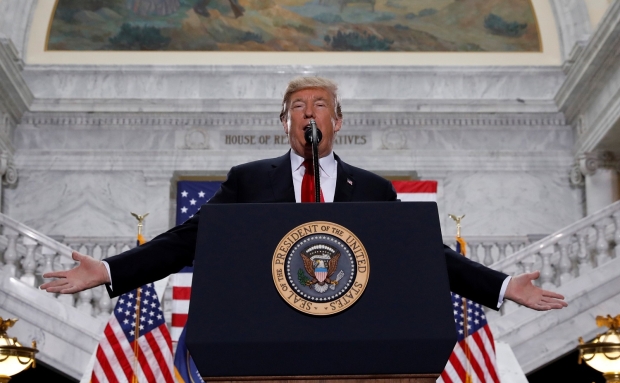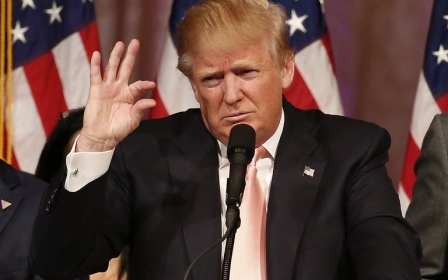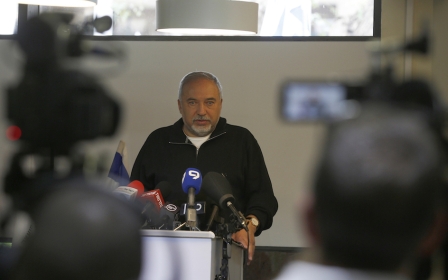Syria strike may be a blow to Trump's right-wing base

BOSTON, United States - When Donald Trump ran for president, he touted a non-interventionist foreign policy that would keep the United States out of costly wars in faraway lands.
He blasted his Democratic opponent Hillary Clinton as “trigger-happy,” saying that recent episodes of US interventions have "produced only turmoil and suffering and death".
Syria’s messy civil war, in particular, was a conflict that Trump said he would not get involved in.
Now, as Trump considers punitive military strikes against the Syrian government for a suspected chemical weapons attack on a rebel-held area, he risks alienating some of his supporters who were drawn in by his non-interventionist foreign policy platform.
The suspected attack on the Damascus suburb of Douma on 7 April killed dozens, according to rebel sources.
All the geniuses tell us that Assad killed those children, but do they really know that? Of course they don’t really know that. They’re making it up
- Tucker Carlson, Fox News
Talk of potential strikes on the Syrian government comes less than two weeks after Trump declared that US troops would be out of Syria “very soon”.
Trump promised there would be a “big price to pay” for the attack. On Tuesday, the White House said the president would be cancelling a trip to South America slated for the weekend in order to “oversee the American response to Syria".
Now, influential conservatives - among them some of the most visible and vocal supporters of Trump’s agenda - are speaking out against intervention in Syria and warning the president not to strike.
Conservative commentators turn on Trump
On Fox News - Trump’s favourite cable news channel - host Tucker Carlson railed against striking Syria on Monday night.
“All the geniuses tell us that [Syrian president Bashar al]-Assad killed those children, but do they really know that? Of course they don’t really know that. They’re making it up,” he said.
“They have no real idea of what happened. Actually, both sides in the Syrian civil war possess chemical weapons. How would it benefit Assad using chlorine gas last weekend? Well, it wouldn’t.”
He warned that a war to overthrow Assad would lead to chaos and thousands of atrocities.
“In fact we might likely see the genocide of one of the last remaining Christian communities in the Middle East,” he added.
Influential conservatives like Ann Coulter shared Carlson’s monologue while adding their own displeasure with the president.
Coulter wrote: “The worst thing [Trump] could do is allow himself to be manipulated by the Cohen raid into an attack on Syria,” referencing the FBI raid on the offices of Trump’s personal lawyer Michael Cohen on Monday.
Conservative blogger Mike Cernovich, who has 415,000 followers on Twitter, also suggested that the Syrian government was not behind the chemical weapons attack.
“Yes, I totally believe that right as Trump announced a troop withdrawal from Syria, Assad gassed children. I also 100% trust the State Department on this, and also believe there were WMDs in Iraq. I SINCERELY believe this and am not being sarcastic at all,” he wrote on Sunday.
Far-right talking points
White supremacist Richard Spencer, who credits Trump for emboldening far-right movements in America, has spent the last several days railing against US intervention in Syria while adding the Syrian government flag to his Twitter username.
On Sunday, he shared a picture of Assad and his family, writing: “Israel (with American approval) is, of course, attacking the civilized, European societies - the people who *should* rule the region.”
David Duke, the former Grand Wizard of the Ku Klux Klan who expressed support for Trump, tweeted an image of a billboard depicting Russian President Vladimir Putin alongside Assad and Hezbollah leader Hassan Nasrallah on Monday. “We must give thanks to those protecting Christians - and curse those to hell, who aren’t,” he wrote.
During a white nationalist rally in Charlottesville, Virginia last August, far-right YouTuber Tim Gionet, better known as Baked Alaska, showed off an attendee wearing a t-shirt that read “Bashar’s Barrel Delivery Co.” - a reference to the Syrian government’s use of barrel bombs.
“Assad did nothing wrong,” he commented. “Barrel bombs, hell yeah.” Meanwhile, another man shouted “Assad’s the man!” from off camera.
Alex Fields Jr, a white nationalist attendee who struck and killed a counter-protester at the rally with his car, had reportedly posted a photograph of Assad in full military uniform on his Facebook page.
While the views espoused by members of the far right may not be shared by mainstream conservatives, white nationalists have been increasingly influential in right-wing politics.
Khan Sheikhoun
Trump set the stage for criticism on Syria intervention when he strongly pushed against military strikes as his predecessor Barack Obama considered taking action against Damascus for alleged chemical weapons use in 2013.
In August 2013, Trump tweeted: “What will we get for bombing Syria besides more debt and possible long term conflict? Obama needs Congressional approval.”
In September of that year, he wrote (in all capital letters): “AGAIN, TO OUR VERY FOOLISH LEADER, DO NOT ATTACK SYRIA - IF YOU DO MANY VERY BAD THINGS WILL HAPPEN & FROM THAT FIGHT THE U.S. GETS NOTHING!”
But last year, after the Syrian government was accused of killing more than 87 people in a chemical weapons attack on Khan Sheikhoun, he changed his tune, launching a strike on Syria’s Shayrat air base.
However, that attack appeared to be a one-off.
At the time, the White House said that Trump’s sudden change of heart was the result of being moved by dramatic images of the victims in Khan Sheikhoun. His daughter Ivanka reportedly influenced his decision to intervene.
The April 2017 strikes on Syria were met with similar condemnation among conservative commentators and supporters who felt betrayed by Trump moving away from the non-interventionist foreign policy he promised on the campaign trail.
Trump’s 2017 strike was eventually forgiven by his supporters, but a more involved attack might not be so easily forgotten.
There are also indications that Trump’s resistance to foreign intervention was a factor that helped him win the election in key battleground states.
In a 2017 paper, Boston University political science professor Douglas Kriner and University of Minnesota law professor Francis Shen studied how sacrifices made by American communities in recent wars correlated with voting at the ballot box.
They found that communities that had suffered more casualties were more likely to vote for Trump.
“We find that there is a significant and meaningful relationship between a community’s rate of military sacrifice and its support for Trump,” the authors wrote. “Indeed, our results suggest that if three states key to Trump’s victory - Pennsylvania, Michigan and Wisconsin - had suffered even a modestly lower casualty rate, all three could have flipped from red to blue and sent Hillary Clinton to the White House.”
Trump's success in the 2020 election, they noted, could rest on how his administration approaches war.
New MEE newsletter: Jerusalem Dispatch
Sign up to get the latest insights and analysis on Israel-Palestine, alongside Turkey Unpacked and other MEE newsletters
Middle East Eye delivers independent and unrivalled coverage and analysis of the Middle East, North Africa and beyond. To learn more about republishing this content and the associated fees, please fill out this form. More about MEE can be found here.





